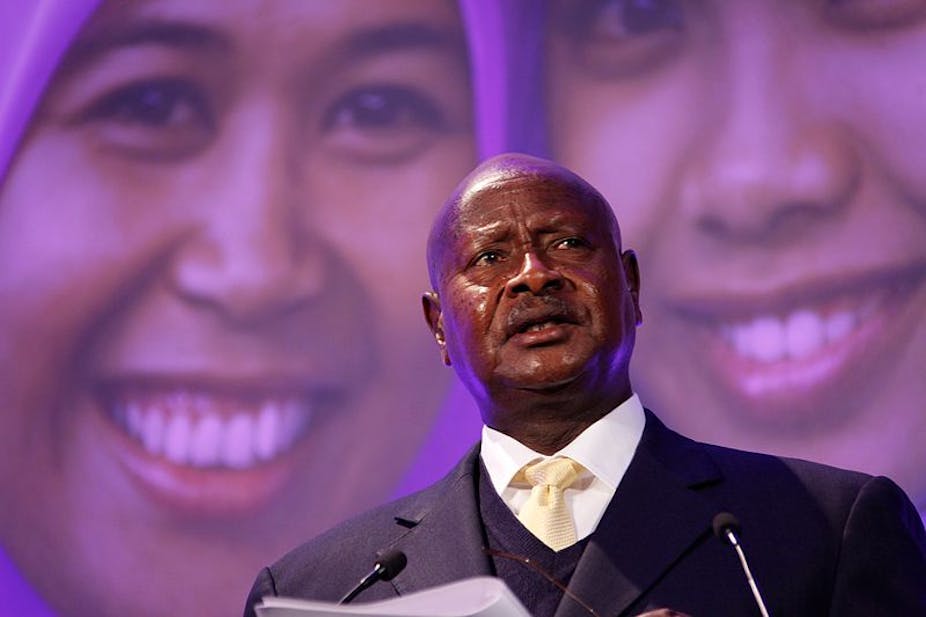The passing of the anti-homosexuality bill (AHB) has been dubbed a surprise Christmas present to Uganda’s large and powerful Pentecostal-charismatic community, but last week’s law banning homosexuality was actually an undelivered present that was promised last year.
In October 2012, the speaker of the Ugandan parliament, Rebecca Kadaga arrived at Uganda’s Entebbe airport to cheering crowds, mainly from Pentecostal-charismatic churches, greeting her as a heroine. Kadaga was returning from a visit to Quebec, where she had accused the Canadian foreign minister, John Baird, of “arrogance … [and] attacking Uganda and promoting homosexuality”. She reminded Mr Baird that Uganda was no longer a colony or protectorate. In front of the cheering audience she promised that the AHB would be passed by the end of the year as a “Christmas gift for Ugandans”.
As it turned out the bill was not passed that year and although much pressure was exerted by conservative religious leaders during the past 12 months, nobody expected that Kadaga’s promise would come to pass this December, just a few days before Christmas.
However, on Friday, December 20, the Ugandan parliament passed the notorious AHB, formerly known as the “Kill the Gays Bill”. The original inclusion of the death penalty for people found guilty of “aggravated homosexuality” has been removed, but severe punishments remain. Legislation against homosexuality is not new in Uganda, as a vestige of British colonial legislation that outlawed the practice. What the AHB does is greatly enhance the level of punishment and breadth of crimes that one can be punished for. Punishments include the threat of life imprisonment for LGBTI people and prison sentences for people who do not immediately report “homosexual practices” to the authorities.
The bill was almost passed without any public announcement on the last day that parliament sat in 2013, right after the high profile passing of an anti-pornography bill that itself significantly clamped down on freedoms. Meanwhile, much of civil society, state ministries and the media was winding down for Christmas and simply unprepared to protest, investigate or analyse. The passing of the bill was so low profile that there is even some debate whether it has legally passed given concerns raised by Uganda’s prime minister, Amama Mbabezi, that poor attendance in parliament meant that there was not a legal quorum.
Power of piety
The tenacity of the campaign attempting to push the bill through parliament reflects the increasingly influential role that conservative Pentecostal-charismatic churches play in shaping state policy and public debate. Public figures such as Rebecca Kadaga, Janet Museveni, the first lady, and David Bahati, the original promoter of the bill, among many others, have strong links with the Pentecostal-charismatic world and they actively work toward the promotion of conservative forms of Christianity in politics while aiming to change Ugandan society through a religious inspired struggle. It seems they are slowly succeeding.
It is impossible to isolate any analysis of Ugandan politics and society from these emerging religious dynamics. Equally, LGBTI activism needs to take into account the importance of religion in influencing the political and societal leadership in a country like Uganda. Religion is inextricably woven through the political and social fabric of Uganda and must be engaged with, not ignored.
Pentecostal-charismatic Christianity has experienced incredible growth in Uganda in the past 20 years. Figures suggest that one-third of Ugandans now identify as Pentecostal, and it is significantly shaping politics and policy. Beyond the direct influence that churches and their leaders exert on churchgoers through their sermons (which may be attended by tens of thousands); they exert influence through radio shows, TV programmes and associated religious institutions that constantly assert the “growing threat” that homosexuality poses to the nation. Homosexuality is labelled a western import and a sin, while the bill is promoted as a defence of “African tradition” by rejecting Western “immoral and corrupted” values for Christian ones.
Churches are strategic, aiming to influence the development of the next generation of political leaders, inculcated with Pentecostal ideas and values, with the aim of shaping the ideas and values of Uganda as a God-fearing country. Pentecostal-charismatic churches are tapping into a deeply religious populous, who provide fertile ground for their values to take hold. And while connections with the US and broader Pentecostal global networks are important, it is important to recognise this phenomenon is led and shaped by national leaders and national churches as a Ugandan project.
There is still hope that the international community will be able to influence the president, Yoweri Museveni, to veto the bill. Likewise, there is hope that the courts can still play a role in declaring the legislation unconstitutional. But LGBTI organisations and sexual minorities will not pass a joyful Christmas this year, while they work hard, and in fear, preparing a response. Accordng to some media sources, an LGBTI activist, Beyonce Amooti Karungi, has already been arrested and released in the immediate aftermath of the bill’s approval. Gifts for some can prove very bitter indeed for others.

